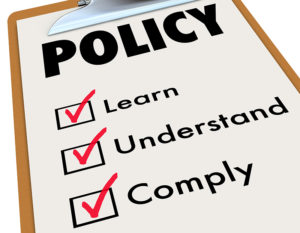The Hierarchy Of HOA Documents: Which Takes Precedence?

HOAs are governed by many rules and regulations — to a point where it may get confusing for both board members and homeowners alike. To avoid any kind of misunderstanding, it’s important to have a clear understanding of homeowners association documents, as well as which HOA documents take precedence in your community.
Browse By Category
Sign up for Our Newsletter
HOAs are governed by many rules and regulations — to a point where it may get confusing for both board members and homeowners alike. To avoid any kind of misunderstanding, it’s important to have a clear understanding of homeowners association documents, as well as which HOA documents take precedence in your community.
The Hierarchy of HOA Documents Explained
As an HOA board member, you have a responsibility to uphold and follow the association’s governing documents. However, these documents were written by people, and people aren’t perfect. Conflicts in provisions happen all the time. It’s also possible that some board members may have different interpretations of the rules and regulations that govern the community. So, what do you do in these instances? How do you ensure that the proper course of action is followed?
The answer is to simply look at the hierarchy of HOA governing documents within your association. Some HOA documents take precedence over others. If you don’t know which one supersedes the others, take a look at the list below:
1. Federal and State Laws and Statutes
The laws of the land take precedence over all other HOA documents. State laws come before local laws, while federal laws outweigh everything else. Whether you’re drafting your governing documents or deciding which one to follow, it’s important to always check the law first. This way, you’re not acting against the laws of the land.
So if your HOA CC&R documents have restrictions on things like sex and religion when it comes to potential homeowners, that would be in conflict with the Fair Housing Act. In this case, the related provisions in your CC&Rs violate federal law, which makes them unenforceable.
2. Recorded Map, Plan, or Plat
Next up on the HOA documents hierarchy is the map or plat that your association recorded with the county office. It’s simply the recorded plan of your entire subdivision or community. This document establishes maintenance responsibility and property location. It also shows the exact dimensions of each unit, easements, and setback requirements. Other items of note include:
- Trash enclosures specifications
- Restrictions on vehicular access
- Handicapped parking spaces and parking restrictions
- Landscaping restrictions
- Lighting requirements and prohibitions
- Areas for future development
- Lighting and other requirements/restrictions
3. CC&Rs
The Declaration of Covenants, Conditions, and Restrictions (CC&Rs) take the third spot on the HOA documents hierarchy. This document details the rights of homeowners and the responsibilities of the HOA board members.
Typically, the CC&Rs also contain stipulations associated with assessment obligations, maintenance responsibilities, and enforcement authority. This is also where you’ll find specific procedures on how to handle various issues such as disputes and violations.
Others know the CC&Rs as the rules of the community. This document guides homeowners on what they can and can’t do, particularly when it comes to property use and other aspects of HOA living. Before purchasing your home in an HOA community, you’ll be informed of the CC&Rs and asked to agree to them. You may even need to sign something as proof of agreement.
When a homeowner violates a covenant, certain consequences take place. Most associations send out a notice of warning on the first offense. Fines and the suspension of privileges are typical courses of action for future violations. Failure to settle these fines can eventually lead to legal action.
4. Articles of Incorporation
The Articles of Incorporation includes essential information such as the legal name of the HOA, address, and the association’s corporate status. Some articles also contain a few basic functions of the HOA. This document, while necessary, doesn’t consist of much. It’s filed with the state upon the formation of the association.
Coming in fourth on the HOA documents hierarchy means the Articles of Incorporation supersede the HOA bylaws and the operating rules. However, they don’t take seniority over the state laws or the CC&Rs. So, if something in your Articles of Incorporation comes into conflict with a provision in your CC&Rs, the latter takes precedence.
5. HOA Bylaws
The HOA bylaws consist of important information related to how the association is run. Like a business, a board of directors oversees the workings of an HOA. The bylaws simply state the particulars of how to operate the HOA, such as how often to conduct meetings, the process of holding meetings, and voting rights. This document also includes how many board members there should be as well as the functions of each of those board members.
As fifth on the list, the only document the HOA bylaws prevail over is the operating rules and regulations. So, if your bylaws clash with, say, your Articles of Incorporation, you must follow the latter document. If you wish to see your HOA bylaws or any other governing document, you can request a copy from your HOA board or with the county recorder’s office.
6. Rules, Regulations, and Resolutions
 Whereas the CC&Rs and bylaws determine the procedures and responsibilities of the HOA board, the rules and regulations focus on the day-to-day aspect of operations. This can include rules regarding clubhouse use, pets, and even architectural or landscaping specifications.
Whereas the CC&Rs and bylaws determine the procedures and responsibilities of the HOA board, the rules and regulations focus on the day-to-day aspect of operations. This can include rules regarding clubhouse use, pets, and even architectural or landscaping specifications.
These rules can change from time to time, though the board must ensure that new rules or amendments don’t come into conflict with other governing documents. Moreover, it’s a good idea to have the association’s attorney look over these policy changes to make sure the board is acting within its scope.
On the other hand, if you’re a homeowner who disagrees with one or some of the operating rules, you’re not entirely powerless. Make sure to let the board know why you (and/or others) oppose the rule. You can also check your local laws or reference other governing documents to see what else you can do. After all, every state and association is different, so what may work for one HOA might not work for another.
Other HOA Documents
Apart from the governing documents, HOAs also have many other official documents. Though these documents do not have a direct bearing on how the association is run, they are nevertheless official records of the HOA. They can provide further insight into an HOA’s operations, which can be helpful if you are a current or potential member of the community. Here are other HOA documents you need to know:
- Board Meeting Notices, Agendas, Minutes, and Committees
- HOA Board Election Notices, Ballots, Minutes
- HOA Membership List or Directory
- Insurance Policies and Records
- Vendor Bid Proposals, Contracts, Third-Party Agreements
- Rental Documents — If your HOA is leasing property, rental documents will include tenant application forms, rental agreements, and rental restrictions.
- Legal Documents — Includes judgments, liens, and other legal records that are not subject to confidentiality agreements
- Financial Documents — Documents that establish the financial status of an HOA include account ledgers, balance sheets, annual budgets, financial statement reviews, annual audits, invoices, reserve studies, tax returns, and bank statements
Who Can Access HOA Documents?
Homeowners
Most states have laws that establish a homeowner’s right to inspect HOA documents. Based on the hierarchy, these laws will take precedence over any stipulation that you may have in your governing documents. As such, homeowners can request copies of official records for whatever purpose they may have. It may be because they are selling their property or they have concerns about how a certain covenant is being implemented in the community.
However, there is usually a procedure for requesting HOA documents — which you’ll also find in your governing documents. For instance, the association may require a written request from the homeowner. The governing documents may also include expected costs for reproducing HOA documents and a minimum number of days for the association to prepare the requested records.
Prospective Homeowners
For prospective homeowners, accessing HOA documents before buying is a must. You need to review these documents to see how the community operates and how life will be like when you join. For instance, there may be rules and regulations that would potentially restrict your personal lifestyle such as commercial vehicle restrictions, pet policies, parking rules, short-term rentals, and aesthetic standards.
What to look for when reviewing HOA documents? Aside from the governing documents, it’s important to inspect the financial documents of an HOA. Are the HOA fees reasonable? Do they have enough funds and reserves? These official records can help you foresee if there could be fee increases or special assessments in the future. As such, make sure to ask the current owner how to request HOA financial statements, apart from the standard governing documents.
In addition, homebuyers should also look into official records involving the property you are planning to buy. Is there a history of violations, unpaid assessments, and judgment liens? Whether or not these HOA documents will affect your decision to buy, what’s important is that you know about them before making a huge financial decision.
Frequently Asked Questions About HOA Documents
Here are the answers to some questions that you may have about HOA documents.
How to Get HOA Documents?
If you are a homeowner, you can send a written request to your association for the specific HOA documents that you want to inspect. However, there are other ways to obtain these records. You can go to your homeowners’ portal and access online copies of the documents. You can also ask your neighbors if they already have a copy of the document that you need. Meanwhile, if you are a potential homebuyer, the current homeowner is typically the one that provides you with the HOA governing documents.
How to Find CC&Rs for a Property?
If other ways to get HOA documents are not possible, you can also search the public records at the county recorder’s office. An HOA’s CC&Rs is a legally-binding document so they must be recorded with the county to become enforceable. HOA covenants that are not recorded with the county are not and should not be enforced within the association.
Are HOA Bylaws Public Record?
Unlike CC&Rs, HOA bylaws do not need to be recorded at the county recorder’s office. However, an HOA may choose to include them in public records should they want to.
Who Pays for HOA Documents?
The person requesting HOA documents also shoulders the costs. These fees will usually cover printing, manpower, and other costs associated with preparing the documents. However, most governing documents will have a cap on how much the HOA can charge for HOA documents.
How Long Does It Take to Get HOA Documents?
It will depend on your HOA so make sure to check your governing documents. Typically, though, upon receipt of the request for HOA documents, an association will have about 10 business days to produce the requested copies.
The Importance of Homeowner Association Documents
 HOA documents are clearly essential for all homeowners associations, no matter the size. They define what HOAs can and can’t do, how to do them, and when to do them. Every organization needs a set of documents governing its operations. Without these documents, an association would fall into anarchy.
HOA documents are clearly essential for all homeowners associations, no matter the size. They define what HOAs can and can’t do, how to do them, and when to do them. Every organization needs a set of documents governing its operations. Without these documents, an association would fall into anarchy.
Consistency is important when it comes to HOA documents. So, whether you’re just beginning to draft your governing documents or considering amending them, make sure they’re in line with the laws and provisions that precede them. This way, you won’t run into conflict or, worse yet, legal trouble.
For further assistance with your HOA documents, consider the benefits of hiring an HOA management company. Can’t find one? Feel free to check out the HOA Management online directory for the best HOA management companies and vendor services in your area!
Want an instant summary of important rules at your HOA? Run an Eli Report
RELATED ARTICLES:
- The Ins And Outs Of Covenant Enforcement For Your HOA
- HOA Attorneys – Why They Are Important and How To Find One
- Can Homeowners Change Rules In Your HOA?
Trending Now
Related Article
Sign up for Our Monthly Newsletter
Sign up below for monthly updates on all HOA Resource

















